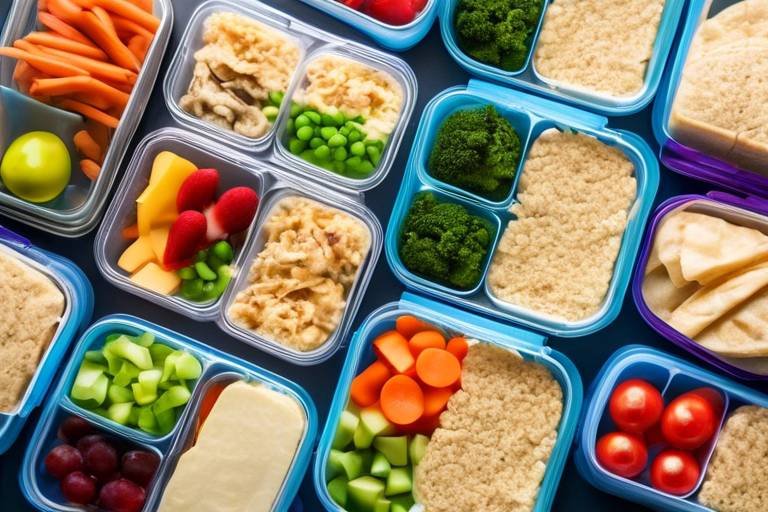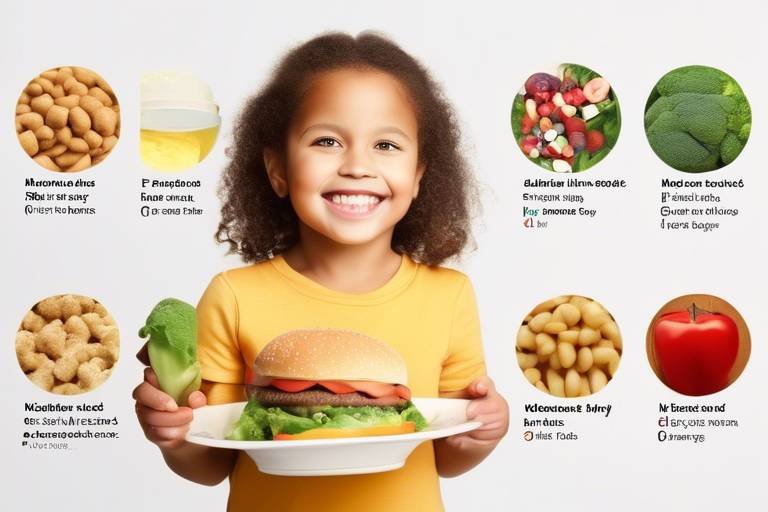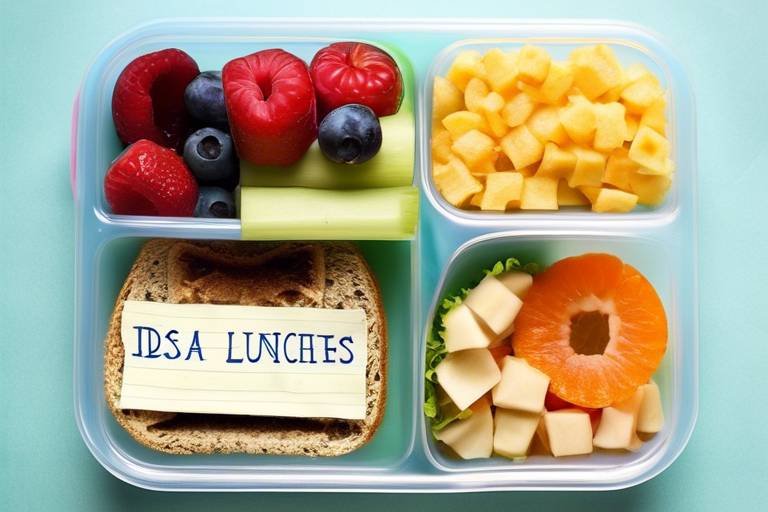Dealing with Nutritional Deficiencies in Kids: What to Do
Nutritional deficiencies in children can be a serious concern for parents, as they can significantly impact a child's growth, development, and overall health. As kids grow, their bodies require a variety of essential nutrients to support everything from their immune system to their cognitive abilities. But what happens when they don’t get enough of these nutrients? Well, that’s where the trouble begins. Imagine a car running on empty; it may still move, but not efficiently or effectively. Similarly, when children lack proper nutrition, their bodies struggle to function optimally.
In this article, we will explore the various nutritional deficiencies that can affect children, their causes, symptoms, and effective strategies that parents can implement to ensure that their kids receive the right nutrients for a healthy and vibrant life. By understanding the importance of nutrition and being proactive, parents can help their children thrive. So, let’s dive into the world of nutritional health and uncover the secrets to keeping our kids nourished and healthy!
Nutritional deficiencies occur when children do not get enough essential nutrients, which can stem from a variety of factors, including poor dietary choices, food allergies, or even socioeconomic status. Each nutrient plays a vital role in a child's development; for example, protein is crucial for growth, while vitamins and minerals support immune function and energy levels. If a child is missing out on these critical components, the repercussions can be severe. Imagine trying to build a house without the necessary materials; the result would be unstable and incomplete. This analogy illustrates how vital a well-rounded diet is for the foundation of a child's health.
Recognizing the signs of nutritional deficiencies is crucial for timely intervention. Parents should be vigilant and observant, as early detection can make a significant difference in treatment and recovery. Symptoms can vary widely, but being aware of them can help parents identify potential nutritional issues in their children before they escalate.
The physical symptoms of nutritional deficiencies can manifest in various ways. For instance, fatigue, poor growth, and skin issues are common indicators that something might be amiss. A child who is constantly tired may not just be having a lazy day; it could point to an iron deficiency. Similarly, if a child is experiencing frequent bruising or has pale skin, it might indicate a lack of essential vitamins. Understanding these signs can empower parents to act quickly and seek appropriate solutions.
It's not just physical symptoms that parents need to watch for; behavioral changes can also be a red flag. Nutritional deficiencies can lead to mood swings, irritability, and concentration issues. For example, a child who suddenly becomes easily frustrated or has trouble focusing in school may be struggling with a lack of essential fatty acids or B vitamins. Just like a car that sputters and stalls when it runs low on fuel, a child's brain can struggle to function when it lacks the nutrients it needs to operate efficiently.
While every child's dietary needs are unique, certain nutrients are more likely to be lacking in children's diets. Below is a brief overview of some common deficiencies:
| Nutrient | Causes | Implications |
|---|---|---|
| Iron | Poor dietary intake, rapid growth | Fatigue, poor cognitive development |
| Vitamin D | Lack of sunlight, poor dietary sources | Weak bones, compromised immune function |
| Calcium | Inadequate dairy intake | Bone health issues, stunted growth |
Iron deficiency is one of the most prevalent nutritional deficiencies in children. It often results from a diet low in iron-rich foods or rapid growth phases. The importance of iron cannot be overstated; it is essential for the production of hemoglobin, which carries oxygen in the blood. Without sufficient iron, children may experience fatigue, poor concentration, and delayed development. Parents should encourage the consumption of iron-rich foods such as lean meats, beans, and fortified cereals.
Vitamin D is crucial for bone health and immune function. Unfortunately, many children are not getting enough of it, primarily due to limited sun exposure and inadequate dietary intake. This deficiency can lead to weakened bones and increased susceptibility to infections. Parents can help by ensuring their children spend time outdoors and consume foods rich in vitamin D, like fatty fish and fortified dairy products.
Preventing nutritional deficiencies is vital for children's health. Here are some effective strategies that parents can implement:
- Promote a balanced diet rich in fruits, vegetables, whole grains, and lean proteins.
- Incorporate diverse food groups to ensure a wide range of nutrients.
- Plan meals ahead of time to avoid last-minute unhealthy choices.
- Encourage healthy snacking options, like nuts and yogurt, instead of sugary snacks.
When in doubt, consulting healthcare professionals is crucial. Pediatricians and nutritionists can provide tailored advice and support to address and manage nutritional deficiencies effectively. They can guide parents on the best dietary practices and suggest necessary tests to identify any deficiencies accurately.
In some cases, dietary changes may not be enough to combat nutritional deficiencies. Safe supplementation options, including vitamins and minerals, can be considered, especially for picky eaters or those with dietary restrictions. However, it's essential to consult a healthcare professional before starting any supplementation to ensure it's appropriate for the child's specific needs.
1. How can I tell if my child has a nutritional deficiency?
Watch for physical symptoms like fatigue, poor growth, or skin issues, as well as behavioral changes such as irritability or difficulty concentrating.
2. What are some good sources of iron for children?
Iron-rich foods include lean meats, beans, lentils, fortified cereals, and spinach.
3. How much vitamin D does my child need?
Children typically need about 600 IU of vitamin D daily, which can come from sunlight exposure and dietary sources.
4. When should I consider supplementation for my child?
If dietary changes aren't sufficient or if your child has specific dietary restrictions, consult a healthcare professional for advice on supplementation.

Understanding Nutritional Deficiencies
Nutritional deficiencies in children can be a silent yet impactful issue that many parents may overlook. These deficiencies occur when kids do not receive enough of the essential nutrients required for their growth and development. Imagine trying to build a house without the right materials; similarly, children's bodies need the right nutrients to develop properly. If these nutrients are missing, it can lead to serious health problems that can affect everything from physical growth to cognitive abilities.
Common nutritional deficiencies include a lack of essential vitamins and minerals such as iron, vitamin D, calcium, and others. Each nutrient plays a unique role in a child's health. For instance, iron is vital for the production of hemoglobin, which carries oxygen in the blood, while vitamin D is crucial for bone health and immune function. When children don't get enough of these nutrients, it can lead to various health issues that can hinder their overall growth.
It's important to understand that nutritional deficiencies can arise from several factors. Poor dietary choices, whether due to a lack of knowledge about healthy foods or simply picky eating habits, can lead to insufficient nutrient intake. Additionally, socioeconomic factors can play a role; families with limited resources may struggle to provide a balanced diet. Furthermore, some children may have medical conditions that affect their ability to absorb nutrients, making them more susceptible to deficiencies.
Recognizing these deficiencies early is crucial. Parents should be aware of the signs and symptoms that can indicate their child is not getting enough of the nutrients they need. For instance, fatigue, irritability, and poor concentration can all be signs of nutritional issues. If you notice these symptoms persisting, it may be time to reassess your child's diet and consider consulting a healthcare professional.
In summary, understanding nutritional deficiencies is vital for ensuring that children grow up healthy and strong. By being aware of the signs and the importance of various nutrients, parents can take proactive steps to ensure their children receive a balanced diet. Remember, just like a car needs fuel to run, children need the right nutrients to thrive!

Identifying Symptoms of Deficiencies
Recognizing the signs of nutritional deficiencies in children is crucial for timely intervention. As a parent, you may often find yourself wondering if your child is getting enough of the essential nutrients they need for healthy growth and development. It's important to be vigilant and observant, as early detection can make a significant difference in your child's well-being. Nutritional deficiencies can manifest in various ways, and being able to identify these symptoms can help you take action before they lead to more serious health issues.
One of the first places to look for symptoms is in your child's physical health. Physical symptoms can range from fatigue and lethargy to more noticeable signs like poor growth or skin issues. For instance, if your child seems unusually tired or is not keeping up with their peers in terms of height and weight, it might be time to evaluate their diet. Skin problems such as rashes or dryness may also indicate a lack of essential fatty acids or vitamins. Here’s a quick breakdown of some common physical symptoms:
| Symptom | Possible Nutritional Deficiency |
|---|---|
| Fatigue | Iron, Vitamin B12 |
| Poor Growth | Calcium, Vitamin D |
| Dry Skin | Essential Fatty Acids, Vitamin E |
| Frequent Infections | Vitamin C, Zinc |
Besides physical symptoms, behavioral symptoms can also provide clues about your child's nutritional status. You might notice that your child is experiencing mood swings, irritability, or has trouble concentrating on tasks. These behavioral changes can be subtle but are often linked to deficiencies in key nutrients. For example, a lack of omega-3 fatty acids may lead to irritability and difficulty focusing, while inadequate iron levels can contribute to feelings of fatigue and apathy. Understanding these connections can empower you to make dietary adjustments that might improve your child's mood and cognitive function.
In summary, being aware of both physical and behavioral symptoms can help you identify potential nutritional deficiencies in your child. If you notice any concerning signs, it’s essential to consult with a healthcare professional who can provide guidance tailored to your child's specific needs. Remember, a well-balanced diet is the foundation for a healthy, thriving child!
- What are the most common nutritional deficiencies in children? Iron, Vitamin D, and Calcium are among the most prevalent deficiencies.
- How can I improve my child's diet? Incorporate a variety of fruits, vegetables, whole grains, and lean proteins into their meals.
- When should I consult a healthcare professional? If you notice persistent symptoms or have concerns about your child's nutrition, it's best to seek professional advice.

Physical Symptoms
When it comes to our little ones, paying attention to their physical symptoms is crucial. Nutritional deficiencies can manifest in a variety of ways, and as parents, it's essential to be vigilant. For instance, if your child seems unusually fatigued or lacks the energy to engage in play, it might be a sign that they're not getting enough of the right nutrients. Think of it like a car running low on fuel; without the right amount of energy, it simply can't perform at its best.
Another common symptom is poor growth. If your child is consistently falling behind their peers in height or weight, it could indicate a lack of essential nutrients. Growth is like a plant needing sunlight and water to thrive; without proper nutrition, children may struggle to reach their full potential. Additionally, skin issues such as dryness, rashes, or discoloration can also signal nutritional deficiencies. These symptoms are often overlooked, but they can be a window into a child's overall health.
To better understand how these deficiencies can affect your child, consider the following table that outlines some common physical symptoms and their potential nutritional causes:
| Physical Symptom | Potential Nutritional Cause |
|---|---|
| Fatigue | Iron or Vitamin B12 Deficiency |
| Poor Growth | Protein or Zinc Deficiency |
| Skin Issues | Essential Fatty Acids or Vitamin A Deficiency |
It's important to remember that these symptoms can vary widely from child to child. Just like a puzzle, every piece matters in the bigger picture of your child's health. If you notice any of these signs, don’t hesitate to consult with a healthcare professional. Early intervention can make a world of difference in addressing these deficiencies.

Behavioral Symptoms
When it comes to our kids, we often think of physical health as the primary concern. However, can be just as telling when it comes to nutritional deficiencies. Imagine your child, usually a bundle of energy and laughter, suddenly becoming withdrawn or irritable. This change can be a red flag, indicating that something might be off in their diet. Nutritional deficiencies can lead to a range of behavioral changes, and recognizing these signs is crucial for timely intervention.
One of the most common behavioral symptoms is irritability. Have you ever noticed your child becoming easily frustrated or upset over small things? This could be linked to a lack of essential nutrients. For instance, deficiencies in iron or B vitamins can affect mood regulation, leading to those unexpected meltdowns. Similarly, mood swings can be a sign that your child isn't getting the nutrients they need. These swings can be as unpredictable as a rollercoaster, leaving both parents and kids feeling overwhelmed.
Another significant behavioral change to watch for is concentration issues. If your child is struggling to focus on their homework or seems easily distracted during conversations, it might be time to evaluate their nutritional intake. Nutrients like omega-3 fatty acids, iron, and zinc play crucial roles in cognitive function and attention span. A lack of these can manifest as difficulty in paying attention, leading to frustration for both the child and the parent.
Moreover, fatigue can also contribute to behavioral changes. A tired child may seem less enthusiastic about activities they usually love, which can be disheartening. This fatigue often stems from inadequate nutrition, making it essential to ensure that your child is receiving a balanced diet filled with the right nutrients. If you notice a pattern of lethargy, consider reevaluating their meals to incorporate more energy-boosting foods.
In summary, behavioral symptoms linked to nutritional deficiencies can be subtle yet impactful. Parents should remain vigilant and observe their children's behavior closely. If you notice any of these troubling signs, it may be worth consulting a healthcare professional. Remember, addressing these issues early can make a world of difference in your child's overall well-being and development.
- What are the most common nutritional deficiencies in children?
Common deficiencies include iron, vitamin D, calcium, and B vitamins. Each of these plays a vital role in a child's growth and development.
- How can I ensure my child is getting enough nutrients?
Focus on providing a balanced diet that includes a variety of fruits, vegetables, whole grains, lean proteins, and healthy fats. Consulting a nutritionist can also be beneficial.
- When should I consider supplementation for my child?
If dietary changes are insufficient or if a healthcare professional recommends it, supplementation can be a safe option to address specific deficiencies.

Common Nutritional Deficiencies in Kids
Nutritional deficiencies in children are more common than many parents realize. These deficiencies often stem from picky eating habits, busy lifestyles, or a lack of awareness about the nutritional needs of growing kids. When children do not receive adequate amounts of essential nutrients, it can lead to a variety of health issues that may affect their growth, development, and overall well-being. Some of the most common deficiencies include iron, vitamin D, and calcium. Understanding these deficiencies is crucial for parents who want to ensure their children are getting the nutrition they need.
Iron deficiency is particularly prevalent among children, especially those aged 1 to 3 years and adolescent girls. Iron is essential for producing hemoglobin, which carries oxygen in the blood. A lack of iron can lead to anemia, resulting in fatigue, weakness, and impaired cognitive function. Symptoms may not always be obvious, which is why it's important to monitor your child's diet closely.
Next on the list is vitamin D deficiency. This vitamin is vital for bone health and immune function. Many children do not get enough sunlight exposure, which is necessary for the body to produce vitamin D naturally. Additionally, diets lacking in vitamin D-rich foods—such as fatty fish, fortified dairy products, and egg yolks—can exacerbate this deficiency. A lack of vitamin D can lead to rickets in severe cases, a condition characterized by weak or soft bones.
Finally, we have calcium deficiency, which is crucial for developing strong bones and teeth. Children require sufficient calcium during their growth spurts to build a solid bone structure. Dairy products are the most well-known sources of calcium, but many kids may shy away from these foods. This can lead to weakened bones and increase the risk of fractures later in life.
To help visualize these common deficiencies, here's a table summarizing the key nutrients, their importance, and food sources:
| Nutrient | Importance | Common Food Sources |
|---|---|---|
| Iron | Essential for blood production and cognitive development | Red meat, beans, spinach, fortified cereals |
| Vitamin D | Vital for bone health and immune function | Fatty fish, fortified milk, sunlight |
| Calcium | Crucial for strong bones and teeth | Dairy products, leafy greens, fortified juices |
In summary, being aware of these common nutritional deficiencies can empower parents to make informed dietary choices for their children. By ensuring a balanced diet rich in these essential nutrients, parents can help promote healthy growth and development in their kids.
1. How can I tell if my child has a nutritional deficiency?
Look for signs such as fatigue, poor growth, or behavioral changes. Consulting a pediatrician for blood tests can provide a definitive answer.
2. What are the best sources of iron for kids?
Iron-rich foods include red meat, beans, lentils, and fortified cereals. Pairing them with vitamin C-rich foods can enhance absorption.
3. How much vitamin D do children need?
Typically, children need about 600 IU of vitamin D daily, but this can vary based on age, health, and exposure to sunlight.
4. Can I give my child supplements for these deficiencies?
Yes, but it's crucial to consult a healthcare professional before starting any supplementation to avoid overdosing or potential interactions.

Iron Deficiency
Iron deficiency is a common nutritional issue that affects many children worldwide. It occurs when the body does not have enough iron to produce hemoglobin, which is essential for transporting oxygen in the blood. Without adequate iron, children can experience a range of health problems that can hinder their growth and development. This deficiency is particularly concerning because it can lead to anemia, which can result in fatigue, weakness, and impaired cognitive function. As parents, understanding the causes and implications of iron deficiency is crucial to ensuring our kids thrive.
So, what causes iron deficiency in children? There are several factors to consider. Firstly, a poor diet is a significant contributor. Many kids tend to favor processed foods over nutrient-rich options, leading to insufficient iron intake. Additionally, certain life stages, such as rapid growth during infancy and adolescence, increase iron requirements. Children who are picky eaters or those who follow vegetarian or vegan diets may also be at a higher risk of developing this deficiency if they do not consume adequate iron-rich foods.
Recognizing the symptoms of iron deficiency is key to addressing the issue early on. Common signs include:
- Fatigue: Kids may feel unusually tired or lethargic.
- Pale skin: A noticeable paleness, especially in the face and inner eyelids, can be a red flag.
- Frequent infections: Iron plays a role in immune function, so deficiencies can lead to increased susceptibility to illnesses.
- Behavioral changes: Mood swings or irritability can also be linked to low iron levels.
To combat iron deficiency, it’s essential to incorporate iron-rich foods into your child's diet. Foods such as red meat, poultry, fish, lentils, beans, and fortified cereals are excellent sources. Pairing these foods with vitamin C-rich options like oranges or bell peppers can enhance iron absorption, making it even more effective. For example, serving a stir-fry with chicken and broccoli or a breakfast of oatmeal topped with strawberries can provide a delicious and nutritious boost to iron levels.
If dietary changes alone are not sufficient, it may be necessary to consider iron supplementation. However, it’s crucial to consult with a healthcare professional before starting any supplements, as excessive iron can lead to toxicity. A pediatrician can provide guidance on the appropriate dosage and whether supplementation is necessary based on your child's specific health needs.
In summary, iron deficiency is a significant concern for children's health that can impact their physical and cognitive development. By being vigilant about dietary choices and recognizing the symptoms, parents can take proactive steps to ensure their children receive the iron they need for optimal growth and well-being.
1. What are the best sources of iron for children?
The best sources of iron for children include red meat, poultry, fish, beans, lentils, tofu, fortified cereals, and dark leafy greens. Pairing these with vitamin C-rich foods can enhance absorption.
2. How can I tell if my child is iron deficient?
Look for symptoms such as fatigue, pale skin, frequent infections, and behavioral changes. If you suspect a deficiency, consult a healthcare professional for testing and advice.
3. Is it safe to give my child iron supplements?
While iron supplements can be beneficial for children with diagnosed deficiencies, it is essential to consult a pediatrician before starting any supplementation to avoid the risk of iron overload.
4. Can a vegetarian diet provide enough iron for children?
Yes, a vegetarian diet can provide sufficient iron if it includes a variety of iron-rich foods such as legumes, nuts, seeds, and fortified cereals. Combining these with vitamin C can improve absorption.

Vitamin D Deficiency
Vitamin D is often referred to as the "sunshine vitamin" because our bodies naturally produce it when exposed to sunlight. However, many children, especially those who spend a lot of time indoors or live in areas with limited sunlight, may find themselves lacking this crucial nutrient. Vitamin D is essential for calcium absorption, which is vital for bone health and development. Without sufficient vitamin D, children can face serious health issues, including weakened bones and increased susceptibility to infections.
Several factors contribute to vitamin D deficiency in children. For instance, dietary habits play a significant role. Many kids may not consume enough foods rich in vitamin D, such as fatty fish, fortified dairy products, and egg yolks. Additionally, certain medical conditions can hinder the body's ability to absorb vitamin D effectively. It's also worth noting that skin color can influence vitamin D synthesis; children with darker skin may require more sun exposure to produce adequate amounts of the vitamin.
Parents should be vigilant about the signs of vitamin D deficiency. Common symptoms include:
- Fatigue - Children may seem unusually tired or lethargic.
- Bone pain - Complaints of discomfort in the bones or joints can be a red flag.
- Frequent infections - A weakened immune system can lead to more colds and illnesses.
To combat vitamin D deficiency, parents can take proactive measures. Encouraging outdoor playtime can help children soak up some much-needed sunlight. Aim for at least 15-30 minutes of sun exposure a few times a week, depending on skin type and weather conditions. In addition to sunlight, incorporating vitamin D-rich foods into your child's diet is crucial. Here’s a quick table summarizing some excellent dietary sources of vitamin D:
| Food Source | Vitamin D Content (IU per serving) |
|---|---|
| Salmon (3.5 oz) | 570 |
| Sardines (3.75 oz) | 270 |
| Fortified Milk (1 cup) | 120 |
| Fortified Orange Juice (1 cup) | 137 |
| Egg Yolk (1 yolk) | 37 |
If dietary changes and sunlight exposure are insufficient, it might be necessary to consider vitamin D supplementation. However, it's essential to consult a healthcare professional before starting any supplements, as they can provide personalized recommendations based on your child's specific needs. Remember, maintaining an adequate level of vitamin D is not just about preventing deficiencies; it's about laying the foundation for a healthy and active life for your children.

Strategies for Prevention
Preventing nutritional deficiencies in children is a crucial responsibility for parents, and it doesn't have to be a daunting task. With a little planning and creativity, you can ensure that your kids are getting the nutrients they need for healthy growth and development. One of the most effective strategies is to promote a balanced diet. This means incorporating a variety of foods from different food groups, ensuring that your child receives a wide range of essential vitamins and minerals. Think of it like painting a picture; each food group adds a unique color that contributes to the overall masterpiece of your child's health.
Meal planning can be a game changer. By preparing meals in advance, you can avoid the last-minute scramble that often leads to unhealthy choices. Consider sitting down once a week with your kids to plan meals together. This not only teaches them about nutrition but also empowers them to make healthier choices. Aim for meals that include:
- Fruits and Vegetables: These are packed with vitamins, minerals, and antioxidants.
- Whole Grains: Foods like brown rice, whole wheat bread, and oatmeal provide essential fiber.
- Protein Sources: Lean meats, fish, eggs, beans, and nuts are crucial for growth.
- Dairy: Products like milk, yogurt, and cheese are important for calcium and vitamin D.
Another important aspect is to make meals fun and engaging. Kids are more likely to eat healthy foods if they are presented in an appealing way. Get creative with shapes, colors, and textures. For instance, you can create a rainbow salad or use cookie cutters to make fun shapes out of fruits and vegetables. This not only makes mealtime enjoyable but also encourages kids to explore new foods.
Don’t forget about the importance of hydration. Water is essential for overall health, and sometimes kids may confuse thirst with hunger. Encourage your children to drink water throughout the day, and limit sugary drinks. You can make hydration exciting by offering infused water with fruits or herbs, turning it into a refreshing treat.
Lastly, be a role model. Children often mimic their parents’ behaviors, so if they see you making healthy choices, they are more likely to follow suit. Share your journey towards better nutrition with them. Talk about why you choose certain foods and how they benefit your body. This not only helps them understand the importance of nutrition but also fosters a positive relationship with food.
Q: How can I ensure my child is getting enough vitamins and minerals?
A: Focus on providing a variety of whole foods from all food groups. If you're concerned about specific deficiencies, consult a healthcare professional for personalized advice.
Q: Are there any signs that my child may be experiencing nutritional deficiencies?
A: Yes, signs can include fatigue, irritability, poor concentration, and physical symptoms like skin issues or poor growth. If you notice these signs, it’s important to consult a healthcare professional.
Q: Is it okay to use supplements for my child?
A: Supplements can be helpful in certain cases, but they should not replace a balanced diet. Always consult with a healthcare professional before starting any supplementation.

Consulting Healthcare Professionals
When it comes to your child's health, is not just a good idea; it’s essential. As a parent, you might find yourself swimming in a sea of information regarding nutritional needs, dietary guidelines, and the latest health trends. It can be overwhelming! So, when should you reach out for professional help? If you notice any symptoms of nutritional deficiencies or if your child is a picky eater, it's time to bring in the experts. Pediatricians and nutritionists are equipped with the knowledge and tools to assess your child's nutritional status and recommend tailored strategies.
Healthcare professionals can help identify specific deficiencies through various methods, including blood tests and dietary assessments. They can also provide guidance on how to improve your child’s diet without turning mealtime into a battlefield. For instance, a pediatrician might suggest iron-rich foods if your child shows signs of fatigue and poor growth, or they might recommend a vitamin D supplement if your child is not getting enough exposure to sunlight. The personalized approach that professionals offer is invaluable, as they can address your child's unique needs based on their age, lifestyle, and health history.
Moreover, consulting with a nutritionist can open up a treasure trove of information about healthy eating habits. They can help you navigate the complexities of meal planning and food choices, ensuring that your child gets a balanced diet that supports their growth and development. You may even find that a nutritionist can provide creative solutions to make nutritious meals more appealing to your little ones. Remember, the goal is not just to fill their plates but to foster a lifelong love for healthy eating.
Don't hesitate to seek professional advice if you’re feeling uncertain. Here are a few scenarios where professional consultation could be beneficial:
- Your child exhibits persistent fatigue or irritability.
- They have a limited diet or are particularly picky about food.
- You notice signs of poor growth or development.
- There are family histories of nutritional deficiencies.
In conclusion, when it comes to your child's nutritional health, consulting healthcare professionals is a crucial step. They can provide the expertise you need to ensure your child is thriving and getting the nutrients they need for a healthy and vibrant life. So don’t go it alone; reach out and get the support you need!
1. When should I consult a healthcare professional about my child's nutrition?
If you notice any signs of nutritional deficiencies or if your child is a picky eater, it’s a good idea to consult a healthcare professional.
2. What type of healthcare professional should I see?
You can consult a pediatrician for general health concerns and a nutritionist for specific dietary advice.
3. Are supplements necessary for my child?
Supplements may be necessary in some cases, but it's best to discuss this with a healthcare professional.
4. How can I encourage my child to eat healthier?
Involve them in meal planning and preparation, and try to make healthy foods fun and appealing.

Supplementation Options
When it comes to ensuring our kids are getting the nutrients they need, sometimes diet alone just doesn’t cut it. If you've found yourself worrying about your child's nutritional intake, you're not alone. Many parents face the challenge of meeting their children's dietary requirements, especially when they're picky eaters or have specific dietary restrictions. In such cases, supplementation can play a vital role in bridging the nutritional gaps. However, it's essential to approach supplementation thoughtfully and under the guidance of healthcare professionals.
Before diving into the world of vitamins and minerals, it’s crucial to understand that not all children will require supplements. The first step is to assess your child's diet and identify specific deficiencies. For instance, if your child is not consuming enough iron-rich foods, an iron supplement might be necessary. Similarly, if they are not getting adequate sunlight exposure, a vitamin D supplement could be beneficial. The key here is to tailor the supplementation to your child's individual needs.
Here’s a brief overview of some common supplementation options that parents might consider:
| Nutrient | Benefits | Sources |
|---|---|---|
| Iron | Supports growth and cognitive development | Meat, beans, fortified cereals |
| Vitamin D | Essential for bone health and immune function | Sunlight, fortified milk, fish |
| Calcium | Critical for strong bones and teeth | Dairy products, leafy greens, fortified juices |
| Omega-3 Fatty Acids | Supports brain health and development | Fish oil, flaxseeds, walnuts |
When considering supplements, it's also important to adhere to the recommended dosages. Over-supplementation can lead to adverse effects, so always consult with a pediatrician or a registered dietitian before starting any new supplement. They can provide personalized recommendations based on your child’s age, weight, and specific health needs.
In addition to traditional supplements, there are also gummy vitamins and powders that can make taking vitamins more appealing for children. However, keep in mind that these can sometimes contain added sugars, so it's wise to choose brands that prioritize quality and transparency in their ingredients. Always read the labels carefully!
Lastly, remember that while supplements can help, they should not replace a balanced diet. The ultimate goal is to encourage healthy eating habits that will last a lifetime. Incorporating a variety of foods into your child's meals not only ensures they receive the necessary nutrients but also helps them develop a palate for different flavors and textures. So, while supplementation can be beneficial, it should complement, not substitute, a nutritious diet.
- When should I consider giving my child supplements? If your child is a picky eater, has a restricted diet, or shows signs of nutritional deficiencies, consult with a healthcare professional about supplementation.
- Are gummy vitamins as effective as regular vitamins? Gummy vitamins can be effective but often contain added sugars. It’s essential to choose high-quality brands and ensure they meet your child's nutritional needs.
- Can too many vitamins be harmful? Yes, over-supplementation can lead to toxicity. Always follow recommended dosages and consult with a healthcare provider.
- How can I encourage my child to eat a balanced diet? Get creative with meals, involve them in cooking, and offer a variety of foods to make healthy eating exciting!
Frequently Asked Questions
-
What are the most common nutritional deficiencies in kids?
Some of the most prevalent nutritional deficiencies in children include iron, vitamin D, and calcium. These nutrients are crucial for healthy growth and development, and a lack of them can lead to serious health issues.
-
How can I tell if my child has a nutritional deficiency?
Look out for both physical and behavioral symptoms. Physical signs may include fatigue, poor growth, and skin issues, while behavioral changes can manifest as mood swings, irritability, and difficulty concentrating.
-
What are some effective strategies to prevent nutritional deficiencies?
To prevent nutritional deficiencies, focus on meal planning that includes a variety of food groups. Incorporating fruits, vegetables, whole grains, and proteins can help ensure your child receives all the essential nutrients they need.
-
When should I consult a healthcare professional about my child's nutrition?
If you notice any concerning symptoms or have doubts about your child's diet, it’s wise to consult a pediatrician or a nutritionist. They can provide tailored advice and help identify any nutritional issues.
-
Are supplements necessary for children with nutritional deficiencies?
In some cases, dietary changes alone may not be sufficient. Supplements can be a safe option, but it's essential to consult a healthcare professional before starting any supplementation to ensure it's appropriate for your child.



















